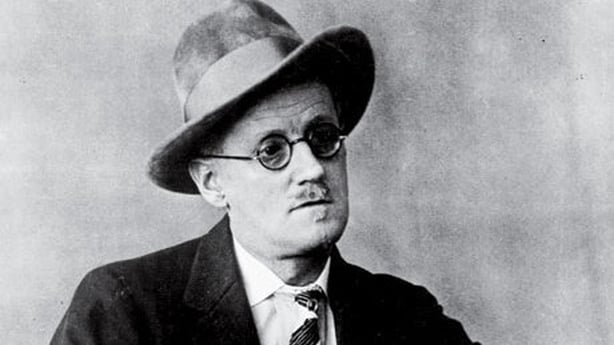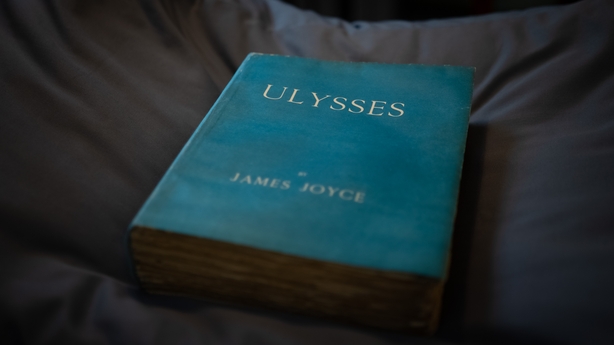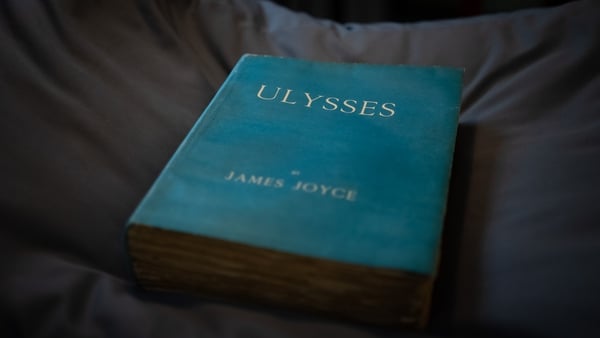It is June 16th 1954, and from his hospital bed, Joyce is trying to find paper to complete his final book. "Almost at an end. The long-awaited work. By me, Joyce. Stanislaus Joyce, brother of...". As Stannie writes, he thinks back to 1905, and his arrival in Trieste.
Nick Midgley introduces his new Drama On One play - listen to Bloomsday above.
Have you noticed the way in which, when there is more than one child in a family, each of them tends to be given a particular role? In my case, my mother always used to say that she hoped I would become a banker, or a lawyer – someone who would earn enough money to look after her in her old age.
My brother, by contrast, was expected to be an 'Artist’. It wasn’t entirely clear what this should involve, but clearly included him being somewhat unstable but brilliant, bringing reflected glory to his parents because of his talent, even if the consequence might be a painful (and impoverished) life… It didn’t really matter than I wrote poetry (and had no interest in banking), or that my brother quite liked the idea of having a comfortable and stable life (and maybe even helping to look after his parents in old age). In both our cases, growing up involved us having to work out our own responses to the expectations we were born into…
It won’t come as any surprise, then, that when I started reading about the life of James Joyce, as a student at university, I quickly became fascinated about his relationship to his younger brother, Stanislaus (or Stannie, as he preferred to be called). As the eldest son of an eldest son, James was his father’s favoured child, carrying all his father’s frustrated hopes for fame and glory. Stannie did his best to follow in his brother’s footsteps, but that meant he was always a step behind – looking up with admiration (and some envy) at his brother’s achievements.

From his teenage years onwards, Stannie kept a diary, much of which was filled with commentary on his brother’s life. Some of this was published posthumously, as The Dublin Diaries (1962), along with a memoir of their childhood together, My Brother’s Keeper (1957). As he recounts in these works, Stannie became Joyce’s first reader and critic – his ‘whetstone’, as Joyce termed it - and gathered materials for his brother to use in the short stories that were eventually to be published as Dubliners. When Joyce went into exile in Trieste with Nora Barnacle, Stannie followed them out there; working tirelessly to earn enough money to allow his brother to write, often ‘rescuing’ him from the bars of Trieste, where he feared his brother was dissipating his talents. Joyce never fully acknowledged his brother’s contribution. Indeed, he cut the character based on him (Maurice) almost entirely from the final version of A Portrait of the Artist as a Young Man. Oh, and when it was finally published, he forgot to include the promised dedication to his brother in Dubliners. No wonder that Stannie, with some bitterness, wrote after his brother’s death that he felt that his elder had ‘used [him], as a butcher uses his steel to sharpen his knife’ – and then left him.
Even today, with biographies and novels about the lives of Joyce’s father, John, his wife Nora, and his daughter Lucia, there is still no full-length book about Stanislaus Joyce. So, with the upcoming 100th anniversary of the publication of Ulysses stimulating me to pick up and re-read his work once again, it was no surprise that I also started to remember my fascination with James Joyce’s brother…

Eighteen months later, and I’m delighted to say that my radio play about the relationship between the brothers, Stannie and James Joyce, is going to be broadcast on RTÉ’s Drama on One, to coincide with this year’s Bloomsday celebrations on 16 June. The production is directed by Dan Reardon, and includes a brilliant young cast, working alongside the veteran actor, Bosco Hogan, who plays Stannie as an old man. The play is called Bloomsday and tells the story – in a fictionalized form – of the ten years when Stannie lived with James Joyce and Nora Barnacle in Trieste, between 1905 and 1915. Joyce wrote in Ulysses that ‘a brother is as easily forgotten as an umbrella’, and in some ways my play was an attempt to bring Stannie back into the story – indeed, to tell his story, the one that he never really got to write.
A small coda, however. After finishing work on the play and having had so much pleasure reading Dubliners, A Portrait and Ulysses again, I decided to take the plunge and have a go at the formidable Finnegans Wake. And what an incredible adventure that has been! Although I hadn’t known about it at the time that I was writing my play, it turns out that Finnegans Wake puts the relationship between two brothers – Shem and Shaun – at the heart of the book. Shem is an artist; and Shaun is a postman - one who can only deliver letters, not write them. ‘Bosom foes’, as Anthony Burgess puts it so pithily. So even in his final work, the family roles were still being played out.
But Finnegans Wake is also a reckoning with these family scripts too. Indeed, despite the contempt in which Shem seems to hold his brother, and the sense of disapproval that Shaun shows towards his irresponsible sibling, in the end they both recognise that they need each other. And love each other too. The family roles each were asked to play is part of what makes them who they are; but in questioning and challenging those roles, they each become the person they should truly be.
Drama On One: Bloomsday by Nick Midgley, 12 June 2022 at 8 pm on RTÉ Radio 1 - listen to more from Drama On One here.
